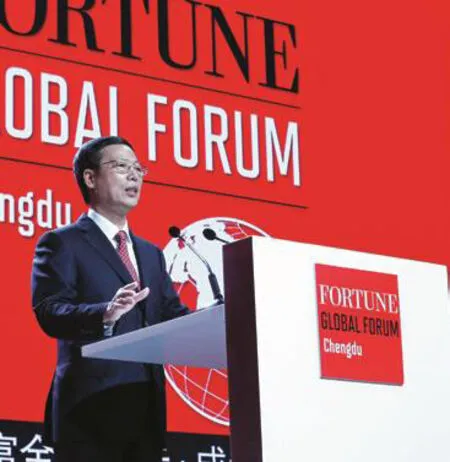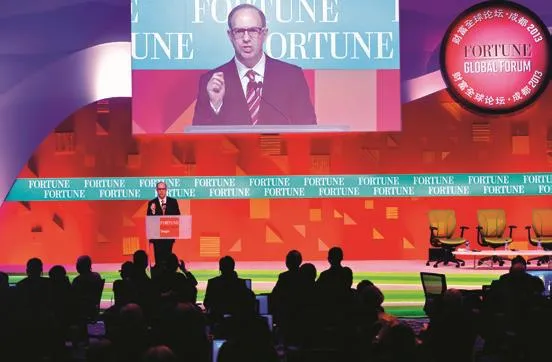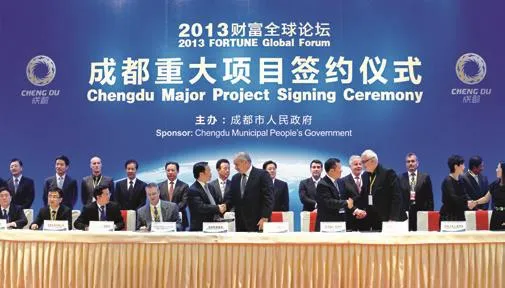Shaping The future
2013-12-07ByYuShujun
By Yu Shujun
fortune Global forum explores the major trends impacting China’s economy
Liu Yonghao, Chairman of New Hope Group, one of China’s largest agribusinesses based in southwest China’s Sichuan Province, didn’t need to fly to Beijing, Shanghai,or New York City to see a top foreign business partner as he might have done. On June 6 and 7, he met with eight of their partners’ high-level executives from the world’s largest companies at the 2013 Fortune Global Forum right on his doorstep in Chengdu, capital of Sichuan.
“They came here not only to attend a conference but also to invest and develop in Chengdu,” said Liu, during a panel discussion of the forum.
The 2013 Fortune Global Forum was held in Chengdu from June 6 to 8, the fourth time that China has held the event, which attracted more than 600 foreign and domestic business and government leaders as well as economists to discuss topics on the theme of China’s New Future.
At the sidelines of the three-day event,74 deals, valued at more than 112 billion yuan ($18.26 billion), were signed between the Chengdu local government and Fortune 500 companies or other renowned multinationals, adding to the investments already made by 238 Fortune 500 companies in the city. Most of the deals are in the hi-tech manufacturing or services industries.
The Fortune Global Forum’s choice of convention site and the Fortune 500 companies’ increasing presence in Chengdu represents not only the rise of west China, but also the ongoing attraction of the Chinese economy.
What are the underlying forces behind China’s incessant momentum amid a lackluster world economy? That was a major topic for discussion at the Chengdu forum.
Having discussed the opportunities brought by the transformation of China’s development model, urbanization as well as the West Development Strategy, most panelists were optimistic about the prospects of China’s economy, yet none of them underestimated the challenge of sustainability that lies ahead.
Driving forces
In the past, the Chinese economy relied too much on exports and government-led investment. “The growth model is running out of gas. They’re going to need to reinvigorate reform,” said Henry Paulson, former U.S. Treasury Secretary at the forum. “What hits me right smack between the eyes is the same thing the Chinese Government knows. They’ve diagnosed the problem and come up with prescriptions.”
China’s new future is defined by proconsumption growth built upon a transition away from manufacturing and more toward urbanization and a more complete social safety net, said Andy Serwer, Managing Editor of Fortune at the opening plenary of the forum.

KEYNOTE SPEECH: China’s Vice Premier Zhang Gaoli delivers an address at the Gala Dinner for the Opening of the 2013 Fortune Global Forum on June 6
China’s service industry is less than 50 percent of the country’s GDP, compared to about 80 percent in the United States. “The service economy of course creates jobs, producing 30 percent more jobs per U.S. dollar in GDP than manufacturing,” said Serwer,adding that other benefits of the service economy include less reliance on resources and more sustainable growth.
A To-Do List
The Fortune Global Forum 2013 was headlined by a speech from Vice Premier Zhang Gaoli. Highlights from the speech include six key points for ensuring China’s steady progress in the future:
● Pursuing development as a path of strategic importance and continuing sustained and healthy economic development
As the largest developing economy in the world with a per-capita income ranking 84th on a global standing, China has no choice but to develop further in a way that is sustainable.
● Speeding up changes to the development model and working to optimize the economic structure
China’s extensive development pattern is impracticable and difficult to sustain, so the country should seek long-term development through economic transition. The goal is to restructure the economy and facilitate this economic transition.
● Enforcing regional development and opening up China’s central and western regions
One of China’s major problems today is its regional income disparity and imbalanced development. The country’s central and western regions boast vast territories, abundant resources and huge potential for new points of economic growth.
● Strengthening the protection of the environment to build a beautiful nation with blue skies,green land and clean water
The ecological environment is an indispensable part of human civilization and China’s development.A sound environment on par with economic and social development demonstrates the real potential of a government and is a responsible solution for future generations. China will take target environmental pollution and seek a balanced development driven by science and resource conservation.
● Prioritizing the people’s well-being and improving their material and cultural lives
Ensuring and improving people’s quality of life is the fundamental purpose of China’s development.As it develops China will work to increase individual income, deepen reform of the income distribution system, and adjust excessively high income so as to achieve common prosperity.
● Deepening reform and opening-up across the board
China will utilize individual and community-level initiatives to implement reforms, and forcefully pursue reform in a top-down manner.The country will form a unified market system with a set of fair, equal and open market rules so that companies with varying kinds of ownerships can compete fairly. Reforms to the administrative system, taxation, finance, and state-owned enterprises will be deepened to create more mature and standardized systems.
Urbanization will also have a profound impact on China’s economy and the Chinese standard of living because it will lead to increased consumption and job creation—a proven formula to lift the nation’s per-capita income, he said.
Dominic Barton, Global Managing Director of McKinsey & Co., said he’s bullish on China’s future, based on what he called China’s “underlying force of growth”—urbanization. McKinsey estimated that China’s urban population will hit 1 billion by 2030.
If urbanization is used to spur the population to spend, then China’s high-speed growth can be prolonged for decades,said Yang Yuanqing, Chairman and CEO of Lenovo Group, a Chinese PC giant.
The Chinese Government’s efforts in completing its social safety net will also help unleash the spending power of the population, said Serwer. A social safety net will also encourage and enable entrepreneurs to innovate and create jobs.
A shift to the service economy, urbanization, and improving social security will certainly benefit China’s western region.Moreover, the west has its own advantages—low-cost labor force, abundant land resources and a vast market, according to Ge Honglin, Mayor of Chengdu. Statistics show that the GDP growth of China’s western region was 12.5 percent in 2012, higher than the national average of 7.8 percent.
Meanwhile, investment in infrastructure is still needed for the less developed west to realize its full economic potential. For example, the United States has 5,000 airports for its 320 million people. But China, with a population of 1.3 billion, only has 400 airports,said Liew Mun Leong, Founding President of the Singapore-based CapitaLand Group and Chairman of Changi Airport. China especially needs more airports in western cities. If the cities are not connected to the outside, they will not be developed, said Liew.

FOCUSING ON CHINA: Andy Serwer,Managing Editor of Fortune, speaks at the opening plenary of the Fortune Global Forum
A boon to multinationals
While the Chinese Government has pledged to protect the rights of foreign investors,especially in regards to intellectual property,individual spending power unleashed by a consumption-driven growth model will also bring opportunities to foreign companies.
The nation is still urbanizing and pension reform is coming, said Wang Jianlin, Chairman of the real estate giant Dalian Wanda Group based in northeast China. “The Chinese moving into the city will need homes and jobs,and they will go to movies and restaurants.”
“The phenomenal growth of China’s film market has been invaluable for the DreamWorks brand,” said Jeffrey Katzenberg,Co-founder, Director and CEO of DreamWorks Animation, which produced the Kung Fu Panda movies. “We are ambitious to see if we could expand beyond producing in the United States a Chinese-themed film every three or four years to become a China-based family brand that regularly creates entertainment in China for China,” said Katzenberg.
China’s urbanization drive will also increase demands on the healthcare system.“As people move up the economic ladder,their demand for healthcare increases,” said Alex Gorsky, Chairman and CEO of Johnson &Johnson.
“China’s vibrant economy is producing strong growth, resulting in a rising population of the middle class,” said Serwer. He estimated the nation’s middle class population will reach 500 million in 12 years.
Accompanying the growing middle class is a spending spree.
Francois-Henri Pinault, CEO of the French luxury group Kering (formerly PPR), said that his company’s brands, including Gucci,Alexander McQueen, Balenciaga and Stella McCartney, are increasingly turning to China as a testing ground for new ideas in apparel and accessories. Gucci only had five stores in China in 2005, now it has 71.
Those Chinese traveling abroad to shop has been considered one of the most promising markets by Angela Ahrendts, CEO of luxury clothing company Burberry Group. “In 2013, 100 million Chinese will travel outside their country, and they will spend 10 times more than they spend in China.” To capitalize on this trend, Ahrendts has outfitted Burberry shops in strategic markets with Mandarin-speaking sales clerks.
Official statistics show Chinese tourists are expected to make 400 million trips overseas in the next five years.
Chinese tourism is the biggest single factor driving Starwood’s growth, not only in China but also in the rest of the world, said Frits van Paasschen, CEO of Starwood Hotels and Resorts Worldwide.

SEALING DEALS: Multinational companies sign 12 deals with the city of Chengdu worth 25.6 billion yuan ($4.17 billion) at a contract signing ceremony held at the city’s Jinjiang Hotel on June 7
Sustainability matters
“The key thing [for China] to focus on is longterm prosperity,” said Paulson. “It takes a different growth model, different environmental practices and different approaches. It’s really more important than 7 percent or 7.5 percent[of GDP growth].”
To sustain economic growth, energy supplies must be secured. “But if we just focus on energy security without addressing climate change and environmental degradation, we won’t find the right solution,” said Fu Chengyu,Chairman of Sinopec, China’s oil conglomerate.
Currently, the efficiency in utilizing all kinds of resources in China is relatively low.China consumes about three times more energy than Europe. If the country improves energy efficiency, then it can achieve two thirds of its energy savings while delivering the same GDP growth rate, said Fu.
China’s energy structure, with 70 percent of energy consumption being coal-based or coal-derived, will remain basically unchanged in the coming 20 to 30 years. In this context,“our responsibility lies in how to deliver clean coal, how to deliver clean coal-based energy,and how to convert coal into other energy sources in a clean manner,” Fu said.
Urbanization and the development of west China will bring enormous opportunities as well as pressure on the environment.The urban environment may deteriorate as the population in cities grows. Local governments in the less developed western region may turn to heavy-pollution industries transferred from the east to seek fast growth.
“When it comes to the environment, you need to have laws, and you need to enforce them,” Paulson said, “But it’s pretty hard to do at the local level when local leaders are focused on driving growth.”
Slowing down the economy and driving reforms, getting more clean fuel in automobiles and getting inefficient coal off the grid are things that must happen in China, said Jeffrey Immelt, Chairman and CEO of GE.
“When both the national government and the provincial governments put their mind on something, this country has the ability to move at scale,” he said. ■
